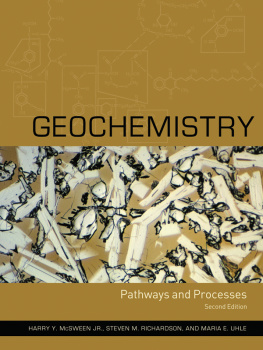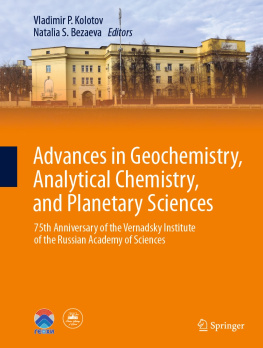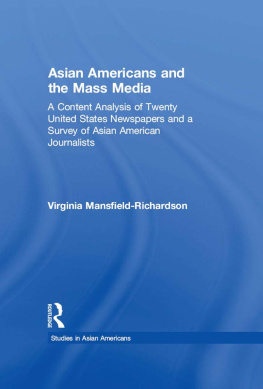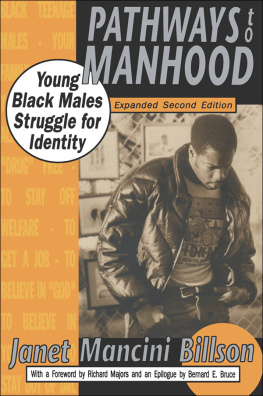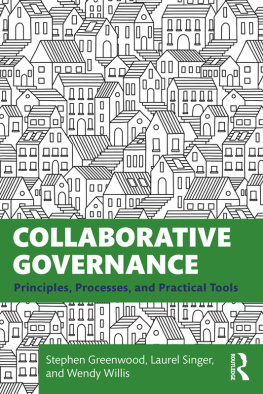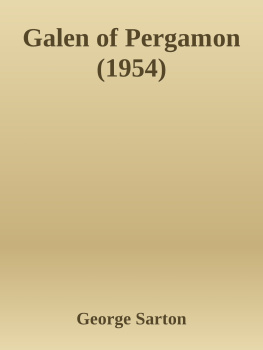Richardson Steven M. - Geochemistry : Pathways and Processes.
Here you can read online Richardson Steven M. - Geochemistry : Pathways and Processes. full text of the book (entire story) in english for free. Download pdf and epub, get meaning, cover and reviews about this ebook. City: New York, year: 2004, publisher: Columbia University Press, genre: Romance novel. Description of the work, (preface) as well as reviews are available. Best literature library LitArk.com created for fans of good reading and offers a wide selection of genres:
Romance novel
Science fiction
Adventure
Detective
Science
History
Home and family
Prose
Art
Politics
Computer
Non-fiction
Religion
Business
Children
Humor
Choose a favorite category and find really read worthwhile books. Enjoy immersion in the world of imagination, feel the emotions of the characters or learn something new for yourself, make an fascinating discovery.
- Book:Geochemistry : Pathways and Processes.
- Author:
- Publisher:Columbia University Press
- Genre:
- Year:2004
- City:New York
- Rating:4 / 5
- Favourites:Add to favourites
- Your mark:
- 80
- 1
- 2
- 3
- 4
- 5
Geochemistry : Pathways and Processes.: summary, description and annotation
We offer to read an annotation, description, summary or preface (depends on what the author of the book "Geochemistry : Pathways and Processes." wrote himself). If you haven't found the necessary information about the book — write in the comments, we will try to find it.
Geochemistry : Pathways and Processes. — read online for free the complete book (whole text) full work
Below is the text of the book, divided by pages. System saving the place of the last page read, allows you to conveniently read the book "Geochemistry : Pathways and Processes." online for free, without having to search again every time where you left off. Put a bookmark, and you can go to the page where you finished reading at any time.
Font size:
Interval:
Bookmark:
GEOCHEMISTRY: PATHWAYS AND PROCESSES
Second Edition
Columbia University Press
Publishers Since 1893
New York Chichester, West Sussex
cup.columbia.edu
First edition 1989 by Prentice-Hall, Inc.
Second edition 2003 Harry Y. McSween, Jr.; Steven M. Richardson; and Maria E. Uhle
All rights reserved
E-ISBN 978-0-231-50903-9
This book was previously published by Prentice-Hall, Inc.
Library of Congress Cataloging-in-Publication Data
McSween, Harry Y.
Geochemistry : pathways and processes.2nd ed. / Harry Y. McSween, Jr., Steven M. Richardson, Maria E. Uhle.
p. cm.
Rev. ed. of: Geochemistry / Steven M. Richardson, c1989.
Includes bibliographical references and index.
ISBN 0-231-12440-6
1. Geochemistry. I. Richardson, Steven McAfee. II. Uhle, Maria E. III. Richardson, Steven McAfee. Geochemistry. IV. Title.
QE515.R53 2003
551.9dc21
A Columbia University Press E-book.
CUP would be pleased to hear about your reading experience with this e-book at .
For Sue, Cathy, and Mike
The various operations of Nature, and the changes which take place in the several substances around us, are so much better understood by an attention to the laws of chemistry, that in every walk of life the chemist has a manifest advantage.
Samuel Parkes (1816), The Chemical Catechism
T he modern geologist with no knowledge of geochemistry will be severely limited. Indeed, geochemistry now pervades the disciplineproviding the basis for measurement of geologic time, allowing critical insights into the Earths inaccessible interior, aiding in the exploration for economic resources, understanding how we are altering our environment, and unraveling the complex workings of geochemical systems on the Earth and its neighboring planets. Geochemical reasoning reveals both processes and pathways, as the books title implies.
Our book is about chemistry, written expressly for geologists. To be more specific, it is a text we hope will be used to introduce advanced undergraduate and graduate students to the basic principles of geochemistry. It may even inspire some to explore further and to become geochemists themselves. Whether that happens or not, our major objective is to help geology students gain that manifest advantage noted in the quote above by showing that concepts from chemistry have a place in all corners of geology. The ideas in this book should be useful to all practicing geologists, from petrologists to paleontologists, from geophysicists to astrogeologists.
Students exposed to a new discipline should expect to spend some time assimilating its vocabulary and theoretical underpinnings. It isnt long, though, before most students begin to ask, How can I use it? Geologists, commonly being rather practical people, reach this point perhaps earlier than most scientists. In this book, therefore, we have tried not to just talk about geochemical theory, but to show how its principles can be used to solve problems. We have integrated into each chapter a number of worked problems, solved step by step to demonstrate the way that ideas can be put to practical use. In most cases we have devised problems that are based on published research, so that the student can relate abstract principles to the real concerns of geologists. Working the problems at the end of each chapter will further reinforce what has been covered in the text.
This attention to problem solving reflects our belief that geochemistry, beyond the most rudimentary level, is quantitative. To answer real questions about the chemical behavior of the Earth, a geologist must be prepared to manipulate quantitative data and perform calculations. We address this philosophy directly at the end of ) to help students put a geological frame around fundamental concepts in chemistry. As in the earlier edition, we have outlined more advanced methods for handling a few specialized math concepts, such as partial derivatives, in an appendix. With these aids, most routine approaches to solving geochemical problems should already be within the students reach.
As the books title suggests, we have tried from the beginning to balance the traditional equilibrium perspective with observations from a kinetic viewpoint, emphasizing both pathways and processes in geochemistry. We have focused initially on processes in which temperature and pressure are nearly constant. After an abbreviated introduction to the laws of thermodynamics and to fundamental equations for flow and diffusive transport, we spend the first half of the book investigating diagenesis, weathering, and solution chemistry in natural waters. We have made significant changes in this second edition of the book by including new chapters on mineral structure and bonding and on organic geochemistry. These concepts are also integrated into other chapters. In the second half of the book, we return for a closer look at thermodynamics and kinetics as they apply to systems undergoing changes in temperature and pressure during magmatism and metamorphism. Stable and radiogenic isotopes are treated near the end of the book, where their applications to many of the previous topics are emphasized. The concept of geochemical systems, introduced in , as we emphasize, respectively, the ocean-atmosphere, the core-mantle-crust, and the planets as systems. In this second edition, we have made special efforts to update examples and worked problems to reflect new discoveries in the field.
The division of geochemical topics outlined above has served us well in the classroom. Among other advantages, it spreads out the burden of learning basic theory and allows the instructor to address practical applications of geochemistry before students eyes begin to glaze over. For those who might want to leap directly to applicable equations rather than follow our derivations, we have placed key equations in boxes. At the other extreme, we hope that instructors and curious students are intrigued by the occasional advanced or offbeat ideas that we have included as highlighted boxes in each chapter. They are intended to provoke discussion and further investigation.
This book is a distillation of what we ourselves have learned from our own teachers and from our many colleagues and friends in geochemistry; the book itself is (eloquent, we hope) testimony to their influences. The appearance of the second edition results largely from the unflagging encouragement and contagious enthusiasm of Holly Hodder, Prentice-Hall editor of the first edition. We have also greatly benefited from the counsel of our new Columbia University Press editor, Robin Smith. We hope that geology students will find this revised edition stimulating, accessible, and useful.
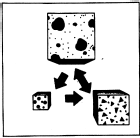 |
In this introductory chapter, our goal is to examine the range of problems that interest geochemists and to compare two fundamental approaches to geochemistry. Thermodynamics and kinetics are complementary ways of viewing chemical changes that may take place in nature. By learning to use both approaches, you will come to appreciate the similarities among geochemical processes and be able to follow the many pathways of change. To develop some skills in using the tools of geochemistry, we also examine the limitations of thermodynamics and kinetics, and discuss practical considerations in problem solving.
In studying the Earth, geologists use a number of borrowed tools. Some of these come from physicists and mathematicians, others were developed by biologists, and still others by chemists. When we use the tools of chemistry, we are looking at the world as geochemists. From this broad perspective, the distinction between geochemistry and some other disciplines in geology, such as metamorphic petrology or crystallography, is a fuzzy and artificial one.
Next pageFont size:
Interval:
Bookmark:
Similar books «Geochemistry : Pathways and Processes.»
Look at similar books to Geochemistry : Pathways and Processes.. We have selected literature similar in name and meaning in the hope of providing readers with more options to find new, interesting, not yet read works.
Discussion, reviews of the book Geochemistry : Pathways and Processes. and just readers' own opinions. Leave your comments, write what you think about the work, its meaning or the main characters. Specify what exactly you liked and what you didn't like, and why you think so.

